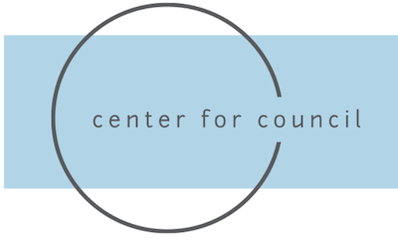|
Center for Council Director Jared Seide recently traveled to Bogota, Colombia, to consult with and lead a Council training workshop for the human rights organization Dejusticia. Below is a reflection on his experience there, and the tremendous importance and applicability of Council in today's world.  Two days before our Bogotá Council Training began, FARC guerillas handed in their remaining guns. The historic Colombian peace accord, agreed to in the Fall of 2016, stipulated that all arms be surrendered between June and August of 2017. And while the peace process has been hailed as a success, some signs of trouble have appeared. In a referendum intended to demonstrate public support for the negotiated agreement, the vote was very close – with “NO” votes garnering slightly higher number than “YES” votes. Underlying this ambivalence were some profound cultural issues that may prove a real hindrance to a lasting reconciliation and peace. As coalitions mobilized to advocate for a political solution, issues of religion, economics, gender, as well as forgiveness and justice, were activated and in some ways played out just under the surface of the public relations campaign around the referendum. Cultural issues touching on “traditional values,” economic disparity, environmental degradation, and political corruption seem to have corollaries to the American political landscape.  Dejusticia is an organization based in Bogotá working at the intersection of justice, academia and community, devoted to research, legislative advocacy, and human rights. The organization plays an important role in the design, promotion and implementation of laws and policies that will shape Colombia’s future. Their scholarly publications, journalistic editorials, legislative work and community engagement has been focused on creating a more equitable, humane and harmonious civil society, and protecting the rights of indigenous peoples and the environment. While the legislative process surrounding the end of hostilities between the government and the so-called “rebels” has been successful, ostensibly, true reconciliation and unity remains elusive. Questions linger around the effectiveness of the justice process and whether the sentences for those found guilty of lawlessness and violence will be widely accepted. What happens next? Are communities ready to make peace, to forgive the deeds and transgressions of the past, once justice has been meted out? Are individuals ready to see one another as compatriots, to trust and rebuild communities that move beyond the antagonisms and resentments embedded in years of violent conflict? The staff of Dejusticia is dynamic and eager; their intelligence, passion and commitment clearly evident. We found them to be candid, articulate and compassionate; the warm camaraderie between them was infectious. And the stress of working with deep and painful issues of violence, exploitation, resentment and extreme economic disparity is apparent. Staff we encountered seemed to have a profound commitment to justice and to advocating for those whose voices have been silenced. They seemed both energized and enervated by the urgency and complexity of the issues they are confronting. And they are navigating the personal impact of the trauma they are encountering and the effect that has on their health and wellbeing.  The recent introduction of staff “wellness support” (yoga, meditation, dance classes) was the idea of Dejusticia’s Director, César Rodriguez Garavito. César first encountered the practice of Council at a “Bearing Witness Retreat” to Auschwitz and he had the thought to explore how this practice might be of benefit to his staff and their self-care, and perhaps increase their engagement with each other and the diverse stakeholders they serve. César asked Center for Council to offer a workshop to core staff, in Bogotá, just prior to Dejusticia hosting an international conference of human rights workers.  Our Council training workshop began in a format this academically-inclined group was accustomed to: rows of chairs were arranged facing the front of the room. The trainers commanded the attention while participants sank into their chairs, ready to receive some value. Their expectations of us were high, but their sense of engagement, with the material and each other, was clearly on hold. After a few minutes of this, we asked them to “press pause” and reflect on this dynamic and the challenges it presents to true engagement. We then shifted the configuration to a circle, and offered a center; there was a palpable shift in energy, as if a new circuit was turned on, a new possibility emerging. Participants remarked that it felt like something unique and interesting was happening, one observed that she sensed “magic” in the circle, another asked if we were all going to cry. As Council was introduced and invited, participants dropped quickly into the practice and shared elements of their personal narratives and aspects of themselves rarely seen at work. Many remarked on how exciting it was to find out things about colleagues they’d worked with for a long time and had never really known. All were grateful for the opportunity to open more of themselves in this “container.”  As Day Two of the training commenced, César admitted he’d had some trepidation about introducing Council to his staff. While he had a strong sense of the power and the value of the practice, he was unsure that the organizational culture at Dejusticia would be conducive to the vulnerability and open-hearted communication that Council invites. He was pleasantly surprised, he said, by how enthusiastically his staff embraced the work and how quickly they understood its value to staff-culture, as well as to the work they do. They began to riff on how Council might be used internally at Dejusticia, how to introduce it to staff that had not been able to attend the workshop, and how it might be incorporated into their upcoming human rights conference. Conversations also emerged around the inflection points in the peace process that were in great need of spaces for real human connection and sharing. In particular, their work with judges and legislators – who seldom have the opportunity to reflect on the impact of the work they do on themselves and others – and the communities struggling to implement reconciliation at the grass-roots level – where sensitive conversations and having important stories told and heard seems a critical step in rebuilding effective and lasting relationships and a solid sense of community.  Post-training, we were grateful for some time to reflect with our hosts on what had been accomplished and what our time together exploring the practice of Council might support, moving forward. Issues of fear, distrust, resentment and inequality are undeniable, alongside real optimism at the prospect of stepping into a fruitful and cooperative chapter in the life of a country that has known much discord and strife, a history of colonialization, oppression and exploitation of natural resources. The smart, eager, passionate staff of Dejusticia are an indication of tremendous potential and commitment. Their recognition and embrace of the importance of self-care, and the integration of their compassionate hearts, as well as their impressive minds, bodes well. Gandhi’s words resonated as we ended the workshop: “If we could change ourselves, the tendencies in the world would also change. As a man changes his own nature, so does the attitude of the world change towards him.” May the practice of Council provide nourishment and resources to these dynamic agents of change, both in their personal lives and the critical work they are doing to promote social justice and human rights in Colombia and the Global South.
0 Comments
Leave a Reply. |
Categories
All
Archives
March 2024
|
|
|
About |
|

 RSS Feed
RSS Feed
